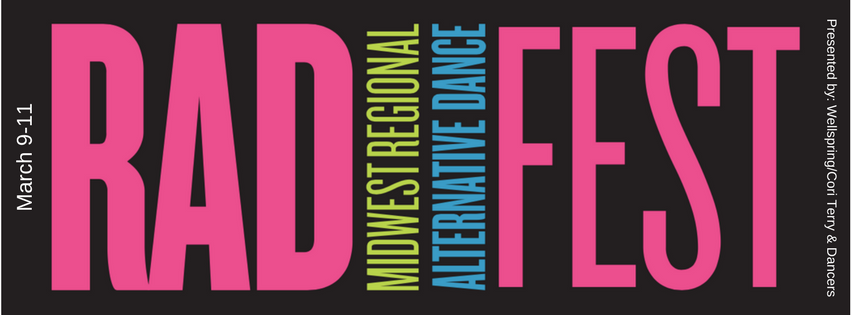KALAMAZOO, MI — Originally from New York, Cori Terry danced with Erick Hawkins in the ’70s and was invited to Western Michigan University (WMU) in Kalamazoo, MI as an artist-in-residence in 1980. She’s been here ever since, founding Wellspring in 1981 as the only professional contemporary dance company in the region. In 2000, Wellspring moved into beautiful new facilities at the Epic Center in charming downtown Kalamazoo, and produced the first Midwest Regional Alternative Dance Festival (RAD Fest) the same year.
Now in its ninth season, RAD Fest puts western Michigan on the cultural map, attracting dance companies and independent choreographers primarily from the midwest, mid- and south-atlantic states and Appalachia for a juried live performance series and youth showcase each March. Submissions for the annual screendance series, a free festival event showing up to 12 dance-for-the-camera works at the Kalamazoo Institute of Arts, has garnered RAD Fest international attention.
Rightly so.
Festival curator Rachel Miller, a Wellspring dancer and talented independent performer, has a keen eye and a refreshingly broad definition of dance that goes far beyond Wellspring’s aesthetic lineage with Erick Hawkins. This was never truer than RAD Fest’s Friday night set at the Epic Center. Those who stayed for both performances (though I’ll just address the first here) were treated to an impressive range of choreographic approaches and technical acuity.
Part of this spectrum includes Wellspring, who opened the festival with a performance of Flux. The 2017 group work is set to a vibraphone and marimba score by long-time WMU music professor C. Curtis Smith, and its breezy, translucent, orange-hued costumes and flowing canons mimic the vibrato of the vibes, leaving traces of the movement behind them as they move toward the next thing, and the next thing. It’s a pretty dance, followed by NYC-based Aaron McGloin’s crisp, cute duet You Are My Lobster, and then everything gets pretty dark from there.

Two solo works, Theresa Bautista’s I am a pretty girl and Eric Mullis’ Paw Creek, are what one might call embodied monologues. The format of setting solo dances to recorded spoken word is easy to mess up, and honestly a bit played out, but these two manage to dodge the cliche. Bautista is a petite powerhouse, filling the Wellspring Theater’s generous stage as she undulates between dance and literal translations of a poem by Shayla Lawson. As a self-described “pretty girl,” the text unpacks the lose-lose business of how women are perceived based on their physical appearance. Provocative statements abound, some landing more strongly than others, but the crux of the piece seems to be about gaps in female empowerment and lack of agency women have to be pretty, or sexy, or ugly, without an attached judgement on their character.
Mullis starts Paw Creek on stage dressed in business casual, and keeps a low center of gravity as he moves to a murky, muted sound score. At intervals, his mouth’s agape, his hand waves to and fro like an underwater needle pulling thread.

These movements are repeated several times, as mixed samples of the Pentecostal preacher Paul Chambers are layered over the song. As the Reverend’s speech talks of levels of consciousness and the “Christian experience” of altered time and mental states – a sort of hypnosis one might attribute to spiritual possession – Mullis similarly ramps up his movement, shuddering and tumbling across the stage, and, in perhaps the work’s most poignant moment, leaning forward to show a literal taking of words from his own mouth. I never thought of the seemingly involuntary movements of believers imbued with the Spirit present in this particular brand of Christian ideology as a dance, but by golly if it isn’t effective.
Nestled between the two solos, Chicago-based Deeply Rooted Dance Theater’s Nicole Clarke-Springer revived her excellent 2015 work Until Lambs Become Lions. This deeply emotional quartet for four women, originally created as a collaboration with the South African Flatfoot Dance Company, is informed by the practice of female genital mutilation found in some African communities. The choreography makes clear that the anguish of these women is more than physical as they walk with pelvises tucked, grasping their skirts between their legs, then cradle and comfort one another in solidarity.
The persuasiveness of Bautista, Mullis, and Deeply Rooted leave the last two works on RAD Fest’s first program by New York-based Jaqueline Dugal and Ainesh Madan feeling a bit flat, though I don’t know if that’s just due to their placement. In the case of Madan, his final image of white roses laid to rest on the chalk outline he’s drawn of a human figure is potent — striking even — his choreography is less so.
—
Live performances of the Midwest RAD Fest continue through Sunday at the Epic Center, 359 S Kalamazoo Mall, Kalamazoo, MI. Tickets are $15 for individual events, $25 per night, or $45 for a festival pass. For more information and a full festival line-up, visit www.midwestradfest.org.
